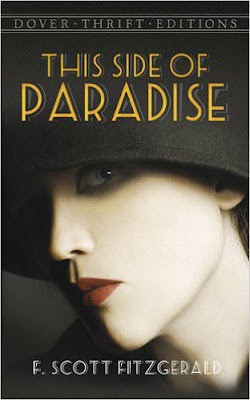 |
| His first achievement. |
There were many takeaway's for me personally during this more recent listen. Here are a few of them.
1. Highest paid short story writer
I knew he was the highest paid short story writer of his era, but I didn't know why. Two factors came into play that caused this to happen. First, he wrote about the Roaring 20's in such a way that teenage girls read the stories to learn how to dress and act and all the rest. Second, two major publishers of short fiction got into a bidding war for his manuscripts. He went from being a no-name writer of little worth to a $4,000 a week writer whose name on the cover guaranteed sales. Lesson: The odds of this latter event ever occurring again are slim. The odds of this happening to most of us who write stories are nil. You're more likely to get struck by an asteroid.
 |
| Great book but weak sales. |
Fitzgerald and his eccentric wife Zelda loved the high life. The problem was that once the cash-spigot got turned off, they never learned how to save or live frugal. And as famous as he had become, for some reason the book didn't sell well. Professor Engel stated that The Great Gatsby is the most popular novel today among high school students, but in its time sales were a flop, in part due to critical reviews. Lesson: If you are a writer hoping to sell lots of books, keep your expectations realistic.
3. Timing is everything
Fitzgerald wrote about the Jazz Age. He even coined the word jazzy which did not exist before. Unfortunately, when his follow up to Gatsby was published America was in the throes of a great depression. Tender Is the Night was another big fail. Lesson: To quote the Beach Boys, "Catch a wave and you're sittin' on top of the world." Fitzgerald's wave had passed. The sun had set on the jazz age and he was left floating in the middle of an empty copper sea.
4. What you say can hurt you
Even though his latest didn't sell and Fitzgerald was struggling to make ends meet, he still managed to get a little cashflow by selling stories. This all came to an abrupt end when he agreed to a three-part series that was published in Esquire called "The Crack-Up". He never published another story again. He was too hot to handle. Lesson: We live in an era where authenticity is valued highly, but complete candor isn't as welcome as the pundits would have you believe. It's wise to be circumspect.
Here's the opening paragraph of Fitzgerald's The Crack-Up.
Of course all life is a process of breaking down, but the blows that do the dramatic side of the work -- the big sudden blows that come, or seem to come, from outside -- the ones you remember and blame things on and, in moments of weakness, tell your friends about, don't show their effect all at once. There is another sort of blow that comes from within -- that you don't feel until it's too late to do anything about it, until you realize with finality that in some regard you will never be as good a man again. The first sort of breakage seems to happen quick -- the second kind happens almost without your knowing it but is realized suddenly indeed.
You can read the rest here.
Download the entire lecture here.
Trivia: When Fitzgerald died his total net worth was $700.
Question: What was your favorite book that you read in high school English class?
* * *
Originally published in August 2014










No comments:
Post a Comment